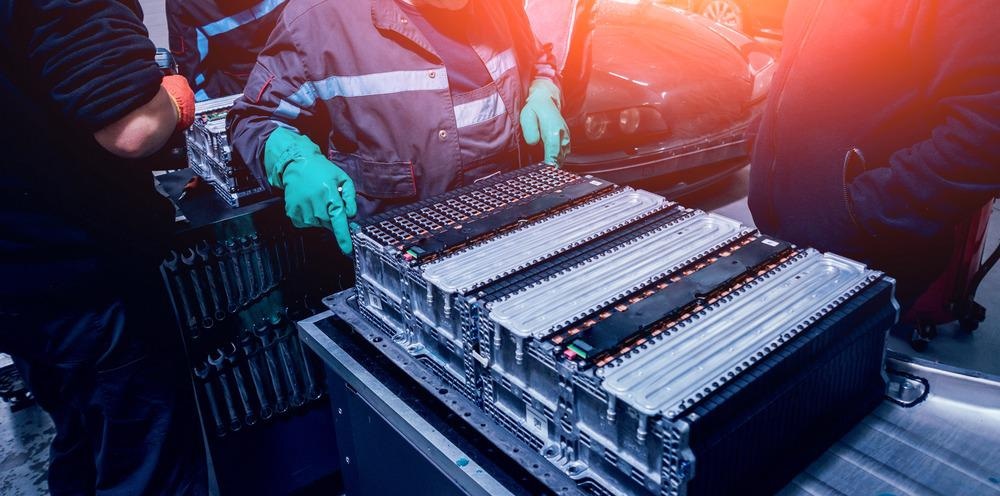The Earth's climate is undergoing rapid changes as a result of pollution. These changes are primarily caused by water, air, and soil pollution. The combustion of fuels used in conventional petrol/diesel vehicles contributes significantly to climate change in the form of air pollution. Approximately 29% of greenhouse gas emissions are directly linked with the transportation sector, with most of the emissions coming from cars and light trucks. Next-generation battery technology could reduce environmental pollution and help avert negative climate change, but how?

Image Credit: Roman Zaiets/Shutterstock.com
The World Economic Forum predicts the number of vehicles will globally reach 2 billion by 2040. According to the United Nations, as the emission of greenhouse gases has doubled since 1980, there has been an average global temperature increase of 0.7 degrees Celsius.
Electric vehicles (EVs) and hybrid electric vehicles (HEVs) are promising alternatives to conventional internal combustion engine-based vehicles. Batteries supply power for EVs and HEVs, leading to low environmental pollution. Extensive studies are being conducted to advance battery management systems for the smooth and easy operation of EVs and HEVs.
Importance of Battery Management System (BMS)
A battery is an electrical energy storage device that is capable of storing a significant amount of energy for a long period. It is important to supervise each cell in operation, which might be hampered because of issues related to cell balancing and the aging of cells.
BMS is a system control unit that ensures the safety of the battery while operating. BMS also presents corrective measures to rectify abnormal conditions at the system infrastructure.
As stated before, batteries play a crucial part in the running of EVs and HEVs. The main advantages of using batteries are high energy density, low environmental pollution, and long cycle life.
However, batteries demand proper care during EV applications. Inappropriate applications could lead to over-voltage, over-current, or over-charging/discharging, which might cause fires or explosions, and even risk the longevity of the batteries. BMS plays a crucial role in maintaining the safety and efficient performance of batteries. Some of the key aspects of BMS of EVs are as follows.
Internal state estimation
The efficiency of batteries depends on internal temperature, state of charge (SOC), and state of health (SOH). These factors must be estimated.
Battery modeling
Battery modeling plays a crucial role in determining battery behavior. This technology is associated with battery state monitoring, thermal management, real-time controller design, and fault diagnosis.
Battery charging
An efficient charging strategy protects batteries against damage as it minimizes temperature fluctuations and enhances energy conversion.
Optimal charging is encouraged because slow charging causes a negative effect on the availability of EV usage, and fast charging may lead to large energy loss and rising temperatures.
Researchers observed that increased variation in temperature promotes the rapid aging of a battery. Such fluctuations may also lead to overheating or supercooling. This phenomenon also shortens the battery service life.
GBatteries and the Cleaner Environment
GBatteries was founded in 2014 and is the only company to demonstrate a novel technology associated with ultra-fast charge lithium-ion batteries without compromising on battery life or changing the battery’s chemistry.
The company’s technology is based on artificial intelligence, signal processing, electrochemistry, and high-power electronics. The company is based in Canada and its main aim is to assist global adoption of EVs.
One of the challenges associated with EVs is battery charging. Charging batteries overnight at home is not a feasible option. Also, taking frequent breaks, for about an hour or so for charging, while on a road trip is inconvenient.
Considering these difficulties, GBatteries develops fast-charging technology that makes EVs hassle-free and encourages more people to use them. This change could minimize harmful emissions and limit environmental pollution.
GBatteries and Li-ion Active Battery Management System
Although some of the available batteries can be charged fast, GBatteries’ technology discharges faster. The company has developed an adaptive pulse charging algorithm, which promotes ultrafast charging for commonly available lithium batteries without affecting cycle life.
GBatteries is mostly associated with advancing software and hardware technology without altering battery composition or chemistry. Importantly, GBatteries is also the first to develop a novel technology that promotes an efficient energy transfer regime.
ChargeSense software is a fully adaptive, proprietary, and self-learning algorithm that generates complex charging pulse profiles based on real-time monitoring and evaluation of the internal state of a battery. Charge profiles also include battery response signatures in real-time, aiding in a significant reduction of irreversible chemical reactions.
GBatteries hardware’s technology is associated with proprietary novel architecture that generates specific engineered pulses at high frequency.
While explaining the science behind the paradigm shift in battery charging, GBatteries stated that impedance is a dynamic determining parameter for battery charge. This factor undergoes rapid change during charging and is affected by the state of battery health and even ambient temperature.
With the introduction of every pulse, ChargeSense detects and charges the battery during the low impedance phase until the critical point retention time is reached. It assists appropriate pausing for an optimal period to allow a small amount of depolarization which allows impedance to drop. This function prevents the occurrence of irreversible chemical reactions.
GBatteries' technology can be used in a wide range of products that utilize a rechargeable lithium-ion battery, including smartwatches, power tools, DJI Tello drones, Xiaomi e-scooter, and electric vehicles.
References and Further Reading
GBatteries. (2021) [Online] Available at: https://www.gbatteries.com/about
Gabbar, A.H. (2021) Review of Battery Management Systems (BMS) Development and Industrial Standards. Technologies, 9, 28. https://doi.org/10.3390/technologies9020028
Liu, K. et al. (2019) A brief review on key technologies in the battery management system of electric vehicles. Frontiers of Mechanical Engineering. 14. pp. 47–64. https://doi.org/10.1007/s11465-018-0516-8
Disclaimer: The views expressed here are those of the author expressed in their private capacity and do not necessarily represent the views of AZoM.com Limited T/A AZoNetwork the owner and operator of this website. This disclaimer forms part of the Terms and conditions of use of this website.